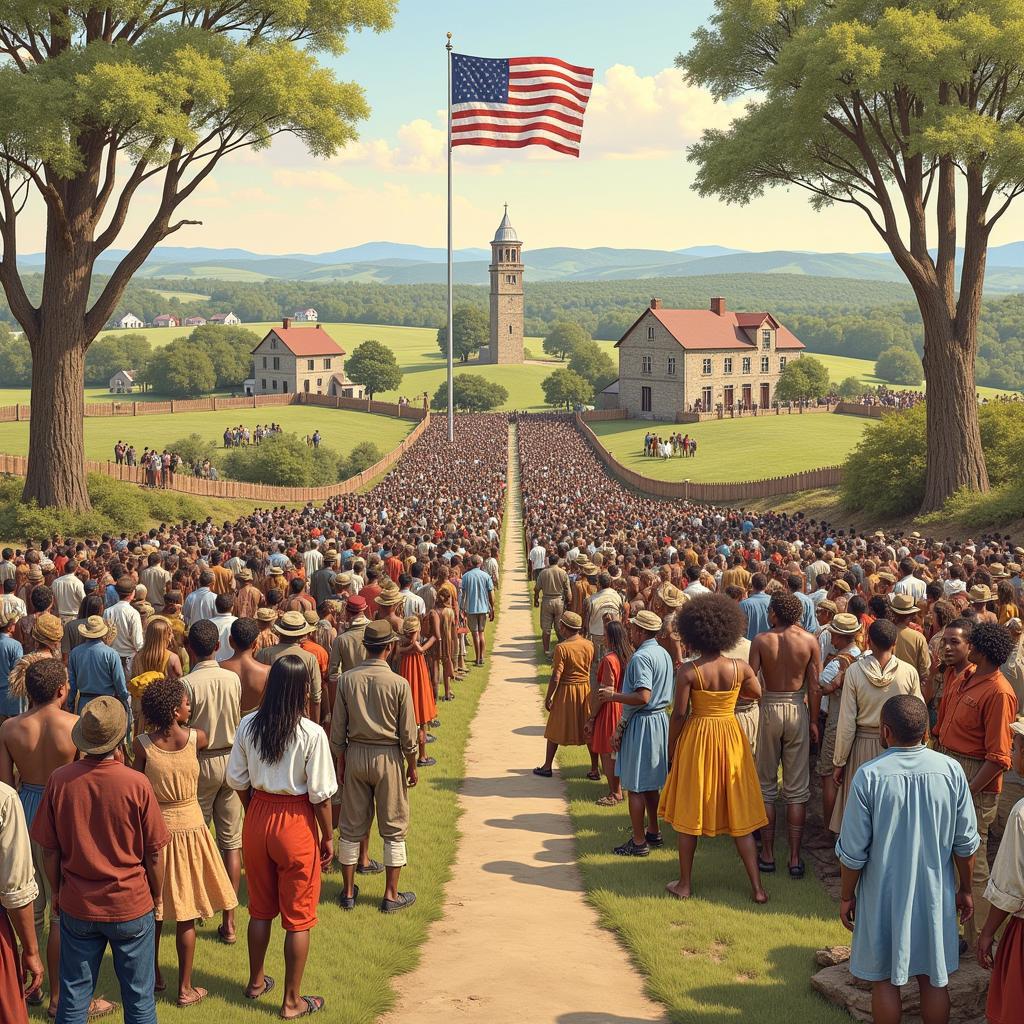Colonial society on the eve of revolution was a complex tapestry of interwoven tensions, aspirations, and identities. By the mid-18th century, the thirteen British colonies in North America had developed distinct social, economic, and political structures, poised for the dramatic changes that lay ahead. Understanding this era requires examining the diverse groups that populated these colonies and the forces that ultimately propelled them toward revolution.
 Colonial Society Hierarchy on the Eve of Revolution
Colonial Society Hierarchy on the Eve of Revolution
Social Structures in Chapter 5: Colonial Society on the Eve of Revolution
Colonial society wasn’t a monolith. Different classes occupied distinct positions, creating a hierarchical structure that often led to friction. At the top were the wealthy merchants, landowners, and government officials. These elites controlled much of the economic and political power, enjoying a lifestyle far removed from the struggles of the lower classes. Below them were artisans, shopkeepers, and small farmers, forming a substantial middle class. Their lives were characterized by hard work and a desire for upward mobility. Indentured servants and enslaved Africans occupied the bottom rung, facing harsh conditions and limited opportunities. This social stratification became a breeding ground for resentment and ultimately fueled the revolutionary fervor. This period is extensively covered in chapter 5, focusing on colonial society on the eve of revolution.
comparative literature and society
Economic Tensions and the Seeds of Revolution
Economic factors played a crucial role in the growing discontent within the colonies. The British mercantilist system, which aimed to benefit the mother country at the expense of the colonies, stifled colonial economic growth. Restrictions on trade, taxation without representation, and the enforcement of the Navigation Acts all fueled colonial resentment. As colonists prospered, they increasingly chafed under these constraints, seeing them as an infringement on their economic liberty. Chapter 5 delves into these economic tensions within colonial society on the eve of revolution.
What were the primary economic grievances of the colonists?
The colonists’ primary economic grievances stemmed from British mercantilist policies, which they perceived as exploitative and restrictive. These policies, including the Navigation Acts and the Sugar Act, severely limited colonial trade and imposed burdensome taxes, fueling resentment and ultimately contributing to the revolution.
The Rise of Political Consciousness
Alongside economic grievances, a growing sense of political consciousness emerged in the colonies. Ideas of self-government and republicanism gained traction, influenced by Enlightenment thinkers like John Locke. Colonists increasingly questioned the legitimacy of British rule, arguing for greater autonomy and representation in their own affairs. The cry of “No taxation without representation” encapsulated this growing political awareness. Chapter 5 on colonial society on the eve of revolution explores the intellectual currents that shaped this period.
How did Enlightenment ideas influence colonial thought?
Enlightenment ideals, emphasizing reason, individual liberty, and natural rights, profoundly influenced colonial thought. These ideas, disseminated through pamphlets and intellectual gatherings, fueled the colonists’ desire for self-governance and resistance against perceived British oppression.
“Understanding the nuances of colonial society on the eve of the revolution requires careful study of the complex interplay of social, economic, and political forces,” notes Dr. Eleanor Vance, a prominent historian specializing in the American Revolution.
Chapter 5 Colonial Society on the Eve of Revolution: A Melting Pot of Cultures
The colonies were a melting pot of diverse cultures, including English, Dutch, German, and African, each contributing to the rich tapestry of colonial life. While this diversity fostered a unique American identity, it also created social and cultural tensions, particularly regarding issues of race and religion. Chapter 5 delves into these cultural dynamics within colonial society on the eve of revolution.
colonization society ap world history
Professor Samuel Cartwright, a scholar of early American history, adds, “The very diversity that enriched colonial society also contributed to the social and political ferment that ultimately led to the revolution.”
Conclusion: Chapter 5 Colonial Society on the Eve of Revolution
Chapter 5’s examination of colonial society on the eve of revolution reveals a society rife with contradictions and on the cusp of transformative change. The complex interplay of social hierarchy, economic grievances, burgeoning political consciousness, and cultural diversity laid the groundwork for the American Revolution. Understanding this period is crucial for comprehending the birth of the United States and the enduring legacy of its founding principles.
FAQ
- What were the main social classes in colonial society?
- How did British mercantilism impact the colonies?
- What role did Enlightenment ideas play in the revolution?
- What were some of the key cultural tensions in the colonies?
- What were the major events leading up to the revolution?
- How did colonial society differ from British society?
- What were the main differences between the northern and southern colonies?
Situations related to chapter 5 colonial society on the eve of revolution
- You are writing an essay comparing and contrasting the social structures of different colonies.
- You are preparing for a debate on the economic causes of the American Revolution.
- You are researching the influence of Enlightenment thinkers on colonial political thought.
- You are creating a presentation on the cultural diversity of colonial America.
- You are developing a timeline of the major events leading up to the revolution.
Other related articles you might find helpful
You might find further insights on this topic by exploring resources on our website related to comparative literature and society, the Medfield historical society, and colonization society in AP world history.
For further assistance, please contact us: Phone: 02043854663, Email: [email protected], or visit our office at Khu 34, Bắc Giang, 260000, Vietnam. Our customer support team is available 24/7.